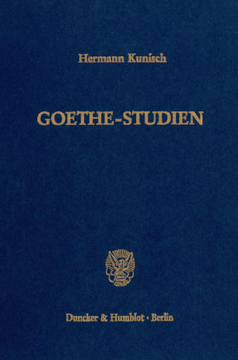Goethe-Studien

BOOK
Cite BOOK
Style
Format
Goethe-Studien
Schriften zur Literaturwissenschaft, Vol. 7
(1991)
Additional Information
Book Details
Pricing
Table of Contents
| Section Title | Page | Action | Price |
|---|---|---|---|
| Vorwort des Herausgebers | 5 | ||
| Inhalt | 7 | ||
| Erstes Kapitel: Goethes Menschenbild | 9 | ||
| I. Daimon | 17 | ||
| II. Das Dämonische | 46 | ||
| Zweites Kapitel: Goethes Frömmigkeit | 84 | ||
| I. Goethes Frömmigkeit | 84 | ||
| II. „Weltfrömmigkeit“ | 99 | ||
| III. „Heilig“ | 99 | ||
| IV. Gott – Natur | 111 | ||
| V. Gesamtcharakter von Goethes „Frömmigkeit“ | 116 | ||
| Drittes Kapitel: Theatrum Mundi. Anfang und Schluß von Goethes ‚Faust‘ | 131 | ||
| Vorbemerkung | 131 | ||
| I. Theatrum Mundi | 132 | ||
| II. Der Rahmen: Gott – Teufel – Mensch | 137 | ||
| III. Fausts Tod und Verklärung | 142 | ||
| Viertes Kapitel: Faust und Helena | 159 | ||
| I. Eigenart des deutschen Weltgedichtes vom Faust | 160 | ||
| II. Der „Helena“-Akt und seine „Antezedenzien“ | 163 | ||
| III. Faust und Helena | 166 | ||
| Fünftes Kapitel: Die „Marienbader Elegie“ | 177 | ||
| Entstehung der ‚Elegie‘ | 178 | ||
| Aufbau der „Trilogie“ und der „Elegie“ | 181 | ||
| Das Grundproblem | 184 |
